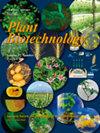AgarTrap Protocols on your Benchtop: Simple Methods for Agrobacterium-mediated Genetic Transformation of the Liverwort Marchantia polymorpha.
IF 1.1
4区 生物学
Q4 BIOTECHNOLOGY & APPLIED MICROBIOLOGY
引用次数: 20
Abstract
Agrobacterium-mediated genetic transformation is a powerful technique in plant biology. We recently developed a simplified Agrobacterium-mediated genetic transformation method for the liverwort Marchantia polymorpha, named AgarTrap (agar-utilized transformation with pouring solutions). AgarTrap is easy to perform; all procedures can be completed within a week using a single plate of solid medium, and basic operations involve simply pouring the appropriate solutions onto the solid medium. Thus far, we have developed three types of AgarTrap methods (S-AgarTrap, G-AgarTrap, and T-AgarTrap) using three different M. polymorpha tissues: sporelings, intact gemmalings, and mature thallus pieces, respectively. Each AgarTrap method can be used to transform tissues at high efficiency, thereby producing sufficient numbers of transformants for study. The ease and efficiency of these AgarTrap methods will likely prompt widespread molecular biological analyses of M. polymorpha. In this review, we describe the basic characteristics of the three AgarTrap methods and present the detailed protocols used in our laboratory.台式AgarTrap协议:农杆菌介导的多形地茅遗传转化的简单方法。
农杆菌介导的遗传转化是植物生物学中一项强有力的技术。我们最近开发了一种简化的农杆菌介导的多态地衣遗传转化方法,命名为AgarTrap(琼脂利用转化与浇注溶液)。AgarTrap很容易执行;所有的步骤都可以在一周内用一块固体培养基完成,基本操作包括简单地将适当的溶液倒在固体培养基上。到目前为止,我们已经开发了三种类型的AgarTrap方法(S-AgarTrap, G-AgarTrap和T-AgarTrap),分别使用三种不同的多态m组织:孢子、完整的小苗和成熟的菌体片段。每种AgarTrap方法都可以高效地转化组织,从而产生足够数量的转化子用于研究。这些AgarTrap方法的简便和高效可能会促进多形霉分子生物学分析的广泛开展。在这篇综述中,我们描述了三种AgarTrap方法的基本特征,并介绍了我们实验室使用的详细方案。
本文章由计算机程序翻译,如有差异,请以英文原文为准。
求助全文
约1分钟内获得全文
求助全文
来源期刊

Plant Biotechnology
BIOTECHNOLOGY & APPLIED MICROBIOLOGY-PLANT SCIENCES
CiteScore
2.90
自引率
18.80%
发文量
45
审稿时长
6-12 weeks
期刊介绍:
Plant Biotechnology is an international, open-access, and online journal, published every three months by the Japanese Society for Plant Biotechnology. The journal, first published in 1984 as the predecessor journal, “Plant Tissue Culture Letters” and became its present form in 1997 when the society name was renamed to Japanese Society for Plant Cell and Molecular Biology, publishes findings in the areas from basic- to application research of plant biotechnology. The aim of Plant Biotechnology is to publish original and high-impact papers, in the most rapid turnaround time for reviewing, on the plant biotechnology including tissue culture, production of specialized metabolites, transgenic technology, and genome editing technology, and also on the related research fields including molecular biology, cell biology, genetics, plant breeding, plant physiology and biochemistry, metabolic engineering, synthetic biology, and bioinformatics.
 求助内容:
求助内容: 应助结果提醒方式:
应助结果提醒方式:


